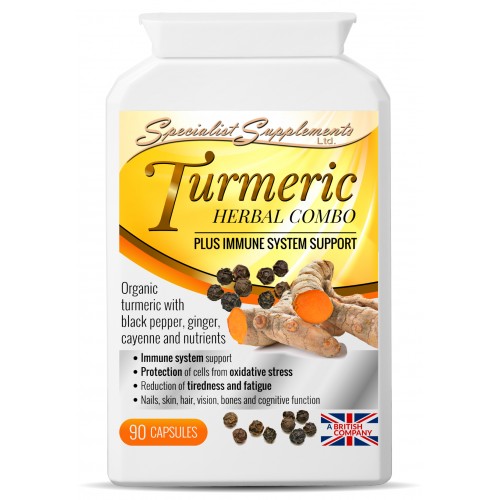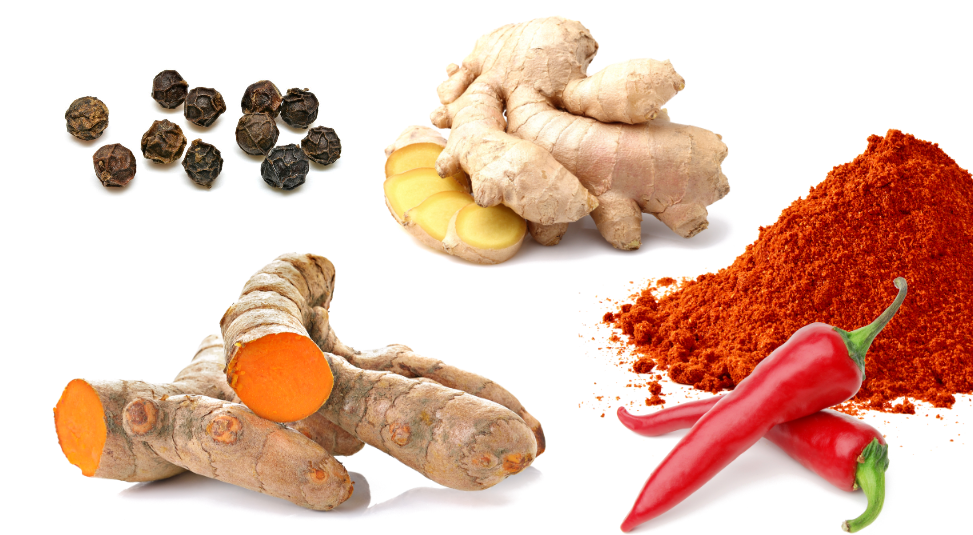
Health Benefits
of Turmeric
Experience the Power of Turmeric
Turmeric is the popular superfood that is taking the health community by storm. With a wide range of medicinal properties and health benefits, it’s easy to see why professionals and studies have indicated that turmeric is a breakthrough in superfoods. Turmeric may assist with weight loss, supporting healthy blood pressure control, supporting joint and muscle health, and also producing potential cognitive benefits

Turmeric is undoubtedly the hottest trend in superfoods right now, and with over 600 reported benefits of the common spice, it is no wonder. From suggested healing properties to body and mind health, turmeric has captured the attention of both the natural health and medical community. Now, the benefits of turmeric can be enhanced through its extract form in a simple and convenient capsule

Ingredients
Turmeric:
Turmeric is perhaps most commonly associated with its anti-inflammatory actions in the context of its potential health benefits. Inflammation is the body’s natural response to injury or infection, often causing localised redness, swelling, pain or heat. It may also cause loss of function of the involved tissues. Acute inflammation is typically a protective and localised response to infection or injury. It is designed to heal the body and restore normal tissue function.
Inflammation of the joints, including stiffness and swelling are common symptoms of arthritis. If inflammation persists for a prolonged period of time, it becomes chronic inflammation. Chronic inflammation can be the result of an infection, autoimmune reaction or allergy.
Studies have shown that curcumin, a compound in turmeric, may reduce inflammation in the body.
Curcumin is a polyphenol. As well as better regulation of inflammation, its other potential benefits include fighting the effects of oxidation (antioxidant activity), better cell signalling, more stable blood sugar and fat levels, and improved brain levels of the omega-3 fatty acid called DHA (docosahexaenoic acid).
The anti-inflammatory and antioxidant effects of curcumin have also been associated with improved regulation of blood pressure and decreased risk of several types of cardiovascular disease.
However, while once only focussed on the anti-inflammatory benefits, studies on turmeric intake now also include its potential for offering detoxification support and improving cognitive function, blood sugar balance and kidney function, as well as lessening the degree of severity associated with certain forms of arthritis and certain digestive disorders.
Turmeric includes three different curcuminoids: curcumin, bisdemethoxycurcumin and demethoxycurcumin. It also contains volatile oils like tumerone, atlantone and zingiberone. These different substances are all associated with their own unique health benefits.
As a result of its properties (particularly anti-inflammatory actions), turmeric is used for a wide variety of health conditions including: arthritis, heartburn (dyspepsia), joint pain, stomach pain, Crohn’s disease and ulcerative colitis, diarrhoea, intestinal gas, stomach bloating, loss of appetite, jaundice, liver problems, Helicobacter pylori (H. pylori) infection, stomach ulcers, irritable bowel syndrome (IBS), gallbladder disorders, high cholesterol, a skin condition called lichen planus and fatigue.
It is also used for headaches, bronchitis, colds, lung infections, fibromyalgia, leprosy, fever, menstrual problems, itchy skin and recovery after surgery.
Other uses include depression, water retention, worms, urinary bladder inflammation and kidney problems.
The dried powdered spice that many people use in cooking comes from the root (rhizome) portion of the plant – Curcuma longa. The unprocessed form of this root bears a strong resemblance to ginger root, and that resemblance is not a coincidence! Turmeric and ginger are both plants belonging to the Zingiberaceae family.
Gnger root:
Ginger is the knotted, beige-coloured root (or rhizome) of the Zingiber officinale plant. Historically, it has a long tradition of being effective in alleviating symptoms of gastrointestinal distress.
In herbal medicine, ginger is regarded as an excellent carminative (a substance which promotes the elimination of intestinal gas) and intestinal spasmolytic (a substance which relaxes and soothes the intestinal tract).
Modern scientific research has also revealed that ginger possesses numerous therapeutic properties including antioxidant effects, an ability to inhibit the formation of inflammatory compounds and direct anti-inflammatory effects.
This is because ginger contains potent anti-inflammatory compounds called gingerols. These substances are believed to explain why so many people with osteoarthritis or rheumatoid arthritis experience reductions in their pain levels and improvements in their mobility when they consume ginger regularly.
In two clinical studies involving patients who responded to conventional drugs and those who didn’t, physicians found that 75% of arthritis patients and 100% of patients with muscular discomfort experienced relief of pain and/or swelling
Cayenne:
Regarded by most herbalists as the purest and safest stimulant known, cayenne opens up every tissue in the body to help increase the flow of blood and therefore improve circulation.
It is also used in the treatment of poor digestion, as a carminative, to increase gastrointestinal secretions and as an anti-spasmodic for the relief of pain. This is because cayenne pepper contains capsaicin, which gives the spice its heat and has analgesic properties.
The pain-reducing effects of capsaicin are due to its effect on substance P, which is a chemical released in tissue damage that alerts the body to injury. Long-term or repeated exposure to capsaicin can reduce substance P in an area, leading to a diminished pain response.
Piperine:
Piperine is the alkaloid responsible for the pungency of black pepper and long pepper. It increases thermogenic activity in the body and is therefore often included in weight loss formulas – thermogenesis is the way of developing cellular energy and this results in an increase in the metabolic rate of the body.
However, piperine has been included in this formula because of its ability to potentiate the absorption of the other herbal actives. In particular, it boosts the bioavailability of curcumin.
Zinc:
Zinc contributes to the maintenance of normal bones, normal DNA synthesis, normal acid-base metabolism, normal carbohydrate metabolism, normal cognitive function, normal fertility and reproduction, normal macronutrient metabolism, normal metabolism of fatty acids, normal metabolism of vitamin A, normal protein synthesis, the maintenance of normal hair, nails and skin, the maintenance of normal testosterone levels in the blood, the maintenance of normal vision, the normal function of the immune system, the protection of cells from oxidative stress and it has a role in the process of cell division.
Vitamin B6:
Vitamin B6 contributes to the normal function of the immune system, the regulation of hormonal activity, normal cysteine synthesis, normal energy-yielding metabolism, normal homocysteine metabolism, normal protein and glycogen metabolism and the reduction of tiredness and fatigue.
